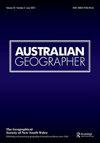“你应该早点回来”:澳大利亚新冠肺炎应对措施对侨民关系的分裂影响
IF 2
2区 社会学
Q2 GEOGRAPHY
引用次数: 2
摘要
澳大利亚在很大程度上被认为是一个移民接收国,然而,据估计,在任何时候都有超过一百万的澳大利亚人生活在海外。尽管如此,侨民关系从未特别牢固,其后果在2019冠状病毒病大流行期间尤为明显。澳大利亚在处理这一流行病时采用了严格的封闭边界办法,尽管有效地减少了病毒的传播,但有人认为,这种孤立主义办法损害了侨民关系。本文利用对居住在海外的澳大利亚人的深入访谈的结果,证明该国对Covid-19大流行的反应在澳大利亚与其外籍人士之间造成了群体间的分歧。社会认同理论和群体间威胁理论将被用来支持澳大利亚外籍人士成为“外群体”的发现,被居住在本国的“内群体”视为现实的威胁。公众对病毒的恐惧和澳大利亚严格的孤立主义立场,在边境内的人和试图入境的人之间造成了分歧。本文提供了澳大利亚侨民的第一手经验和情感,同时建议进一步研究探索居民国民的视角,以促进对该主题的更有力的理解。本文章由计算机程序翻译,如有差异,请以英文原文为准。
‘You should have come back earlier’: the divisive effect of Australia’s COVID-19 response on diaspora relations
ABSTRACT Australia is largely considered an immigrant-receiving country, however, it is estimated that over one million Australians are living overseas at any given time. Despite this, diaspora relations have never been particularly robust, the consequences of which have become particularly visible during the Covid-19 pandemic. Australia used a strict closed-border approach in handling the pandemic and, although effective at reducing the spread of the virus, it will be argued that this isolationist approach was at the detriment of diaspora relations. This paper uses the findings from in-depth interviews with Australians living overseas to demonstrate that the country’s response to the Covid-19 pandemic created an intergroup divide between Australia and its expatriates. Social identity theory and the theory of intergroup threat will be used to support the findings that Australian expatriates became the ‘outgroup’, perceived as a realistic threat by the resident national ‘ingroup’. Public fear of the virus and Australia’s strict isolationist stance created a divide between those within the border, and those trying to get in. This paper provides the first-hand experiences and sentiments of Australian expatriates, while further research exploring the perspective of resident nationals is recommended to facilitate a more robust understanding of the topic.
求助全文
通过发布文献求助,成功后即可免费获取论文全文。
去求助
来源期刊

Australian Geographer
GEOGRAPHY-
CiteScore
4.10
自引率
8.30%
发文量
33
期刊介绍:
Australian Geographer was founded in 1928 and is the nation"s oldest geographical journal. It is a high standard, refereed general geography journal covering all aspects of the discipline, both human and physical. While papers concerning any aspect of geography are considered for publication, the journal focuses primarily on two areas of research: •Australia and its world region, including developments, issues and policies in Australia, the western Pacific, the Indian Ocean, Asia and Antarctica. •Environmental studies, particularly the biophysical environment and human interaction with it.
 求助内容:
求助内容: 应助结果提醒方式:
应助结果提醒方式:


